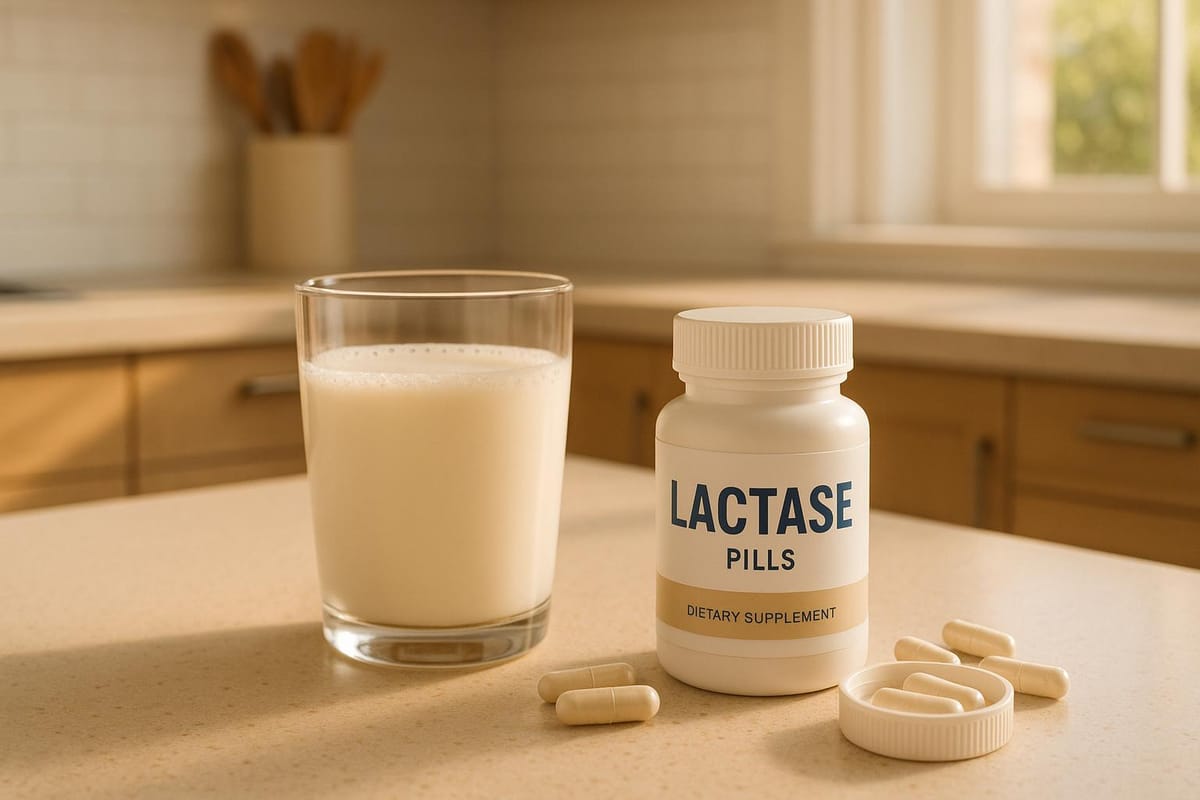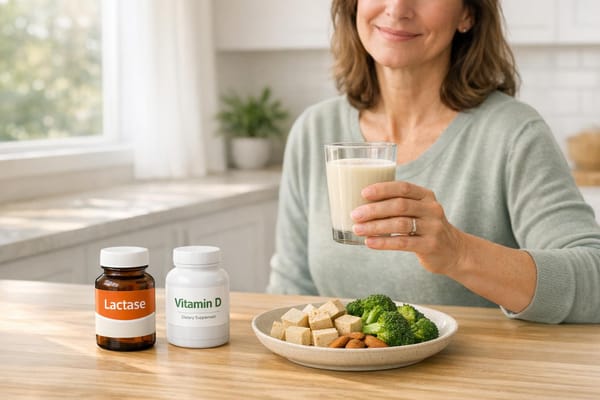Why Lactase Pills Work Differently for Everyone
Lactase pill effectiveness varies based on gut health, dosage, timing, and product quality. Understand how to personalize your approach for better results.

Lactase pills help people with lactose intolerance digest dairy, but their effectiveness varies widely. Here's why:
- Gut health: A balanced gut microbiome can improve lactose digestion, even with lactase pills. Probiotics may help.
- Timing and dosage: Pills work best when taken right before consuming dairy. Dosage depends on the amount of lactose in your meal.
- Severity of intolerance: Those with mild intolerance might need less enzyme support, while severe cases require higher doses.
- Product quality: Enzyme source, strength (measured in FCC units), and additional ingredients impact performance. Third-party testing ensures reliability.
For the best results, experiment with dosage and timing, and choose high-quality supplements tailored to your needs. If symptoms persist, consult a healthcare provider.
Do Lactase Enzyme Supplements Really Work? - Holistic Balance And Bliss

Main Factors That Affect How Well Lactase Pills Work
How well lactase pills work can vary from person to person, and several factors play a role in determining their effectiveness. Knowing these factors can help you understand why your results might differ from someone else's.
Gut Health and Bacteria Balance
Your gut health significantly impacts how your body processes lactose, even when you take lactase pills. Certain beneficial bacteria, like bifidobacteria, naturally aid in breaking down lactose by converting it into short-chain fatty acids without creating excess gas. Interestingly, regular lactose consumption can lead to "colonic adaptation", where your gut microbiota adjusts to handle lactose more efficiently over time. For example, one study revealed that after 12 weeks of daily lactose intake, the relative abundance of Bifidobacterium increased from 5.5% to 10.4%, and fecal β-galactosidase activity doubled.
Maintaining this balance requires consistency. An imbalance or overgrowth of certain bacteria, however, can mimic lactose intolerance symptoms like bloating and gas. Probiotics may support overall gut health by enhancing the microbial balance, which can improve your ability to tolerate lactose. Beyond gut bacteria, the timing and dosage of lactase pills also play a crucial role in how well they perform.
Dosage and Timing
The effectiveness of lactase supplements hinges on both the dosage you take and when you take it. Lactase pills come in varying strengths. For example, standard pills typically contain around 9,000 FCC units, while higher-potency options, such as milktab, provide up to 27,000 FCC units per pill - ideal for managing larger amounts of lactose.
Timing is equally critical. Lactase pills work best when taken right before consuming dairy. If you take them too late, undigested lactose can reach your colon, causing discomfort, gas, and bloating. The amount of lactose in your meal should also guide how many pills you take. For instance, a small serving of cheese might only require one pill, but a large milkshake may need a higher dose. Milktab, for example, suggests a maximum of two pills per day. Additionally, the severity of your lactose intolerance can influence how much enzyme support you need.
How Severe Your Lactose Intolerance Is
The severity of your lactose intolerance is another major factor. Lactase production varies from person to person - some people have a partial deficiency, while others produce little to no lactase at all. This difference affects how much supplementation is necessary. Clinical findings show that individuals with residual lactase activity may handle small amounts of dairy with minimal enzyme support, but those with complete deficiency often require higher doses and more consistent use.
Genetics play a big role here. Around 70% of the global population is lactase deficient, but the severity of intolerance can vary depending on ancestry and individual genetic factors. This explains why some people can enjoy dairy throughout their lives, while others experience symptoms even with small amounts.
Another factor is the speed of your digestive transit. If your small bowel processes food quickly, you might need a higher dose of lactase since the enzyme has less time to act.
"The severity of symptoms depends upon the amount of lactose consumed, the residual lactase function, and the small bowel transit time."
- Talia F. Malik and Kiran K. Panuganti
Finding the right dosage often requires some experimentation. Start with a low dose and adjust based on your needs.
How Product Quality Affects Lactase Pill Performance
When it comes to lactase pill performance, product quality plays a key role. A well-formulated pill can make managing lactose intolerance much easier and more effective.
Source and Purity of the Enzyme
The origin of the lactase enzyme in your supplement has a direct impact on how well it works. Most lactase pills use enzymes derived from fungi, yeast, or bacteria, with each source offering distinct characteristics. For example, fungal lactase - commonly sourced from Aspergillus oryzae and Aspergillus niger - is particularly effective in the stomach's acidic environment. On the other hand, yeast-derived lactase, such as that from Kluyveromyces lactis or Kluyveromyces marxianus, performs better in neutral pH conditions, like those used in milk processing.
Among these, Kluyveromyces marxianus stands out due to its ability to tolerate high temperatures, grow rapidly, and produce enzymes efficiently. In contrast, Kluyveromyces lactis lacks the same level of heat stability, which can limit its overall effectiveness. The microbial source also influences enzyme stability and activity, making it an important consideration when choosing a supplement.
Benefits of Advanced Formulations
While standard lactase pills focus solely on breaking down lactose, advanced formulations go a step further by including additional enzymes like protease and lipase. These multi-enzyme blends aim to support the digestion of not just lactose but also casein proteins and dairy fats, providing more comprehensive relief from dairy-related discomfort.
For instance, products like milktab feature a triple-enzyme formulation designed to enhance overall dairy digestion. Research backs this approach, with one observational study noting significant symptom reductions: abdominal pain decreased by 58%, bloating by 75%, diarrhea by 67%, and nausea by 58%. Some advanced supplements even claim to handle up to 6 grams of fat, 5 grams of protein, and 20 grams of carbohydrates per capsule. Beyond the formulation itself, rigorous testing and compliance with safety standards ensure these products deliver consistent and reliable results.
Third-Party Testing and Safety Standards
Independent testing and certifications are critical for verifying the potency, purity, and safety of lactase supplements. For example, milktab undergoes third-party testing to confirm its enzyme activity (measured in FCC units) and ensure it's free of contaminants. Certifications like vegan, non-GMO, and FODMAP-free further indicate a commitment to meeting diverse dietary needs.
Supplements produced in facilities following Good Manufacturing Practices (GMP) also benefit from strict quality controls. These include proper storage, contamination prevention, and batch consistency testing. By choosing products that openly share their testing protocols and certifications, you can feel more confident about their reliability and performance.
What Research Shows About Lactase Pill Effectiveness
Research indicates that lactase supplements can alleviate symptoms of lactose intolerance, but the extent of relief often depends on the individual. These findings provide a foundation for tailoring lactase supplement use to personal needs.
Clinical Studies on Lactase Supplements
Studies suggest that lactase pills can help minimize lactose intolerance symptoms, though their effectiveness differs from person to person. For instance, one study with 47 participants found a 55% reduction in hydrogen breath levels over three hours when using lactase supplements compared to a placebo. Symptom relief ranged between 45% and 88% depending on the individual’s response. Another study from 2014, which included 96 adults, highlighted significant variability: while 22% of participants achieved complete normalization on hydrogen breath tests, 18% experienced minimal improvement. These averages, however, often obscure the unique factors influencing each person’s experience.
Research Trends vs. Individual Responses
While studies show general improvements, individual outcomes can vary widely. Factors like gut health, timing of supplementation, and the degree of enzyme deficiency play a role in these differences. Genetics and ethnicity also contribute, as lactase deficiency rates vary across populations. Interestingly, some people mistakenly blame lactose for their gastrointestinal issues, leading them to use lactase supplements unnecessarily when other causes might be at play.
Another factor is colonic adaptation, where bacteria in the colon gradually adapt to digest lactose more efficiently. For some, this natural adjustment reduces dependence on lactase pills over time, while others may still need consistent supplementation. Moreover, the controlled conditions of clinical trials - such as standardized dosing and timing - don’t always reflect how people use lactase pills in everyday life. This discrepancy can explain why real-world results sometimes differ from research findings.
New Solutions for Better Results
Recent research has spurred the development of new lactase solutions, aiming to deliver better outcomes for those managing lactose intolerance. With lactose intolerance affecting a significant portion of the global population, manufacturers are crafting advanced formulations designed to provide consistent results that cater to varying levels of severity and individual preferences. These advancements not only improve enzyme effectiveness but also directly address what consumers are looking for.
High-Potency Products for Better Results
Traditional lactase supplements generally provide 3,000–9,000 FCC units per serving. However, newer, high-potency products now offer up to 18,000–27,000 FCC units per pill. This increase allows for better alignment with individual digestive needs, ensuring more effective lactose breakdown for a broader range of users.
Some advanced formulations go a step further by incorporating multiple enzymes to aid in the digestion of not just lactose but also proteins and fats. For example, milktab features a triple-enzyme blend specifically designed to tackle the complex digestion challenges faced by those with lactose intolerance.
The market is clearly moving in this direction. Projections estimate that the lactase enzyme market will reach $1.1 billion by 2033, with North America anticipated to grow at a 3.5% compound annual growth rate over the next decade. Manufacturers are also offering a variety of potency levels, allowing consumers to choose options that align with their specific tolerance levels.
Features That Matter to Consumers
Beyond potency, manufacturers are refining their products to align with modern dietary preferences and demands. There's a noticeable shift toward clean-label, non-GMO lactase enzymes produced through natural fermentation processes, reflecting a growing consumer preference for transparency and naturally sourced ingredients.
Vegan and allergen-free options are also gaining traction. Traditional capsules often contain animal-derived gelatin or high FODMAP ingredients like mannitol, which can exacerbate digestive discomfort for some individuals. Products like milktab address these concerns by offering vegan, non-GMO, and FODMAP-free formulations, making them suitable for specialized diets.
Consumers are also placing greater emphasis on safety and quality. Since supplements are not as tightly regulated by the FDA as prescription medications, there’s increased demand for products that undergo third-party testing and meet high standards, such as those set by the US Pharmacopoeia (USP).
Packaging and dosing innovations are further enhancing convenience and usability. Portable designs and simplified dosing - such as one pill per meal - are making it easier for users to stay consistent and achieve reliable results.
With advancements in potency, formulation, and user-friendly features, lactase supplements are becoming more effective and accessible for individuals managing lactose intolerance. These improvements are helping to meet the diverse needs of consumers while providing better support for their dietary challenges.
Conclusion: Finding the Right Lactase Solution for You
How you respond to lactase supplements can depend on several factors, including your gut health, the severity of your intolerance, dosage, timing, and the quality of the product you choose. Research highlights that not everyone reacts the same way to these supplements, which is why finding the right approach often requires some trial and error.
For the best results, take lactase supplements with your first bite of a meal containing dairy. Most supplements are effective for about 30–45 minutes. If symptoms persist or return, you may need to adjust your dosage gradually.
The quality of the supplement is just as important as timing and dosage. Look for products that have undergone third-party testing and demonstrate reliable enzyme activity. Advanced options like milktab, which feature a triple-enzyme blend - 27,000 FCC units of lactase, 22,000 FCC units of protease, and 1,000 FCC units of lipase - can offer broader digestive support compared to traditional single-enzyme supplements.
"Essentially, other factors may contribute to being unable to metabolize lactose. Despite the positive results for lactase enzymes, some people may need to use other treatment options for their lactose intolerance. Work with your healthcare provider to find the best option for you." - Brittany Lubeck, MS, RDN
When choosing a supplement, consider your dietary needs and preferences. Options that are vegan, non-GMO, or FODMAP-friendly may be better suited for those with additional sensitivities or restrictions.
Lactase supplements are most effective when combined with a broader strategy for managing lactose intolerance. If symptoms persist despite proper use, it’s important to consult your healthcare provider. They can help you explore alternative treatments and ensure you find the most effective solution for your specific situation.
FAQs
How does gut health affect how well lactase pills work for lactose intolerance?
Gut health plays a crucial role in how well lactase pills manage lactose intolerance. When your gut microbiome is balanced, it supports better lactose digestion by boosting enzyme activity and easing symptoms. However, if your gut is out of balance - often due to stress or an unhealthy diet - it can reduce the effectiveness of lactase supplements, making relief harder to notice.
To make the most of lactase pills, keeping your gut in good shape is important. This means focusing on a fiber-rich diet, adding probiotics, and staying hydrated to give your digestive system the support it needs. A healthy gut creates the right conditions for smoother lactose digestion and greater comfort when enjoying dairy.
How can I figure out the best dosage and timing for taking lactase pills?
When figuring out the right dosage and timing for lactase pills, the key is to align it with when you'll be eating dairy. For the best results, take the supplement just before or with your first bite of a dairy-containing meal. This ensures the enzyme is active right when your body starts digesting the lactose.
The amount you need can depend on your lactose tolerance and the dairy content of your meal. A common range is between 3,000 and 9,000 FCC units, but this can vary. Factors like the quantity of dairy, your sensitivity to lactose, and the length of your meal can all influence the ideal dose.
If you're not sure where to start, begin with a smaller dose and gradually increase until you find what works for you. Since everyone's digestion is unique, it might take a bit of trial and error to figure out the most effective approach for your body.
Why do some people still have lactose intolerance symptoms even after taking lactase supplements?
Lactase supplements can be a helpful tool for managing lactose intolerance, but their effectiveness depends on a few key factors. Timing is everything - if you take the supplement too late, it might not work as well. Likewise, using the wrong dosage could mean there's not enough lactase to break down all the lactose in your meal.
Your overall gut health also matters. If your digestive system isn't in great shape or if you consume a large amount of lactose at once, the supplement might struggle to keep up. On top of that, some people have a small amount of natural lactase activity left, which can sometimes lead to lingering issues like bloating or discomfort.
For a more dependable option, milktab offers lactase pills designed to make digesting dairy easier. These vegan, non-GMO supplements feature a triple-enzyme formula, providing a simple and effective way to enjoy dairy without the hassle.



